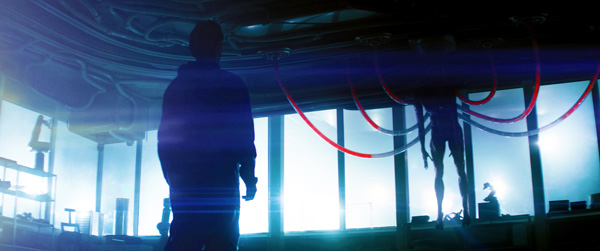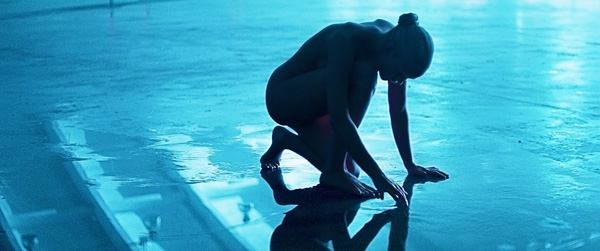The near future: programmer Vince (Toby Stephens), working for the Ministry of Defence, creates a robot (Caity Lotz) that is far too close to human.

The Machine is a moody sci-fi that is constantly raising ideas that it can't or won't investigate. The boundary between artificial and human intelligence, the concept of a soul or emotions that are unique to us, and whether a self-teaching AI is alive or can learn emotions – these are cornerstones of the sub-genre, and have been since Isaac Asimov. Unfortunately, like the “machine” herself, who spends at least one scene dancing in the nude, far more effort has been spent on making the visuals look good than on the story or characters, let alone these issues.
The cinematography is impressive in isolation, with the camera gliding and flying through the decaying industrial spaces, flares that punch through the frame and bleed over the actors, and a misty look that blurs background detail into nothingness. Undoubtedly this is partly due to the low budget, and here the style succeeds, creating an impression of a dark future while only giving us a few glimpses of an outside world.
However, logically, the style makes little sense – science labs, hospitals and cafeterias tend to be well lit, for good reason, so those there can see what they're doing and eating. All too frequently the actors fall into silhouette and their performances are lost.

The script plugs its holes with repetitions of science buzzwords and topical issues – “Turing test”, “quantum”, and war with China earn the most mentions – but still the logical problems remain. Why build an independent almost human AI then persuade it to kill? Why put this AI in a human-like body in the first place? Why does the AI have such a low emotional intelligence? If it has learned from listening and merely mimicking conversations, why does it have emotions at all?
Better execution could have turned these problems into compelling themes and conflicts: perhaps the machine is built out of a Dr. Frankenstein-like curiosity about the human brain, only because it's funded by the military it has to be weaponised, and, over the course of the film it learns language, emotions and ultimately its place in the world. The Frankenstein story has been tried and tested through over a century of adaptations, but to fully follow through on its themes a little breathing room is required, and at 90 minutes this story feels like it's been cut to the bone.
There are still some compelling moments. The opening scene catches us off guard (a touchscreen covered in blood is such a great image) and there are a few sudden twists that work well to wrong-foot your expectations, especially as none of the several different synopses floating around for the film are quite accurate. The small bursts of action are elegantly staged and shot, and the effects hold up even on a low budget, particularly the glowing artificial flesh.
Despite some clunky dialogue and being trapped in a moral grey area (sometimes he appears to be the villain), Toby Stephens acquits himself well, using his theatrical background to bring a sense of gravitas and tragedy to his character. Likewise Caity Lotz pulls off a difficult, slightly inhuman, role with grace, and probably could have handled a more fleshed out emotional arc for her character.
While The Machine contains many of the elements necessary for gripping sci-fi, they have been awkwardly and dispassionately assembled; the result is its own Frankenstein's monster of familiar tropes, with little of the depth or intelligence of the stories that inspired it.
The Machine is in cinemas and VoD now, and on Blu-ray and DVD from 31 March.
Reviewed by Martin Jensen